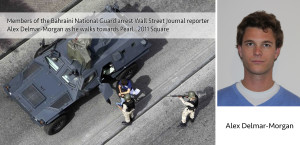Shrinking press freedom only spells more pain for Bahrain
Alex Delmar-Morgan is a freelance journalist in London and writes for a range of titles including the Daily Telegraph and The Independent. He is the former Qatar and Bahrain correspondent for the Wall Street Journal and Dow Jones.
By Alex Delmar-Morgan
Press freedom in the Arab world has been severely tested over the last few years. Many journalists covering the Arab Spring were arrested and deported; some were turned away at the airport. Bahrain, viewed by some as a beacon of progressiveness in the Gulf Arab region before pro-democracy protests erupted in February 2011, was no exception.
In March 2011 I was walking towards Pearl Roundabout, the cradle of the protest movement, when I was bundled into the back of an armoured personnel carrier at gunpoint by the Bahraini army. Ironically, it happened right below a high-rise hotel where a number of foreign journalists were staying. One photographer caught it all on camera from his room.
After a few hours of questioning at a police station, I was released, unharmed. If I had not been an accredited journalist with the authorities, my fate would have been more uncertain. At a minimum, I would likely have faced deportation.
Press freedom has worsened in Bahrain since the Arab Spring. Arrest of local journalists, bloggers and photographers who criticise the government has risen alarmingly. Some remain behind bars.
Bahrain, though, is not Syria or Iran. Initially, foreign media were given access by the government when the Arab Spring broke out. Now it is hard, but not impossible, to get a visa as a foreign journalist. These are usually limited to a few days.
By contrast, it was and remains very difficult to cover political unrest in Saudi Arabia and elsewhere in the Gulf region.
For all the criticism of Bahrain in recent years, it’s important to also remember that it is the only Gulf country with anything resembling a genuine political opposition and an independent press. But, worringly, two things that made Bahrain a beacon of hope in the Gulf before 2011, are increasingly restricted.
What is clear is that the government has done almost nothing to enact the recommendation in the BICI report to reform the government-controlled press, which effectively acts as a propaganda machine for the state. A biased state-run media, the report concluded, and failure to the give the opposition a voice, ‘risks further polarising the political and ethnic divide’. It has done just that.
The authorities are highly suspicious of the foreign media because of the bad press the country has got over the last few years. If Bahrain really wants to promote openness and tolerance as it claims to, a start would be to let more journalists into the country so they can do their job and report on what is actually going on.
Would the government prefer on-the-ground reporting or a story cobbled together by a disgruntled journalist thousands of miles away who has had their visa turned down?
Attempts to restrict free speech and the press in Bahrain will hurt the country in the long run, further polarising sides, making the possibility of reconciliation more unlikely.

